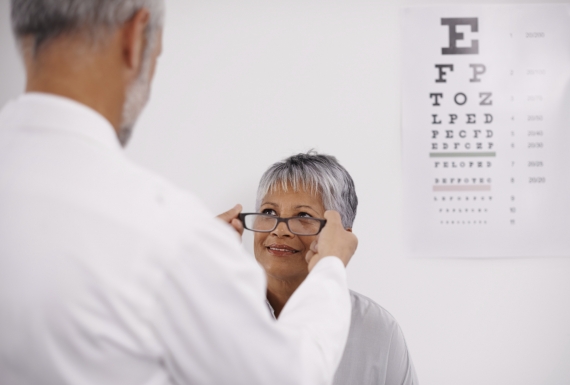Presbyopia Treatment
Presbyopia is a common age-related condition which typically starts around the age of 40 or 45. Treatment options include eye glasses, contact lenses and surgery. A visit to Elmquist Eye Group can help you prevent age from affecting your clear vision.
When we are young, the lenses in our eyes are flexible and soft. Tiny muscles reshape them as needed to focus light on the retina, allowing us to see objects near and far.
As we age, however, the lenses become harder and do not change shape as easily as they once did. This causes light to focus behind the retina and results in our inability to focus on objects that are up close. This is called presbyopia.
 If you have always enjoyed clear vision, you may be surprised to find yourself holding a book further away so that you can read it clearly. But presbyopia is part of the natural aging process of the eye. The signs and symptoms include:
If you have always enjoyed clear vision, you may be surprised to find yourself holding a book further away so that you can read it clearly. But presbyopia is part of the natural aging process of the eye. The signs and symptoms include:
- Difficulty reading small print
- Need to hold reading material farther than arm’s distance
- Problems seeing small objects up-close
- Headaches
- Eyestrain
If you notice any of these changes in your vision, you should visit Elmquist Eye Group in Fort Myers or Cape Coral for a comprehensive dilated eye exam. We can determine if you have presbyopia and advise you about your options.
Dr. E. Trevor Elmquist, one of America’s Top Doctors in ophthalmology, along with his partner, Kate Wagner, OD, and his associate, Nina Burt, OD, provide complete eye care services at Elmquist Eye Group in Fort Myers and Cape Coral, Florida, for everyone in the family.
Dr. Elmquist is a skilled, board certified ophthalmologist, and Drs. Wagner and Burt are board certified optometrists. With state-of-the-art facilities, we offer the most up-to-date treatments for presbyopia and other refractive errors, such as myopia, hyperopia, and astigmatism.
Treatment for Presbyopia
Eyeglasses: The simplest method of correcting presbyopia is with eyeglasses or contact lenses. If you have no other vision problems, prescription lenses are available for reading only. Many people with presbyopia find that bifocals and trifocals help when they already have problems with distance vision.
Contact lenses: People who prefer not to wear eyeglasses often opt for contact lenses to correct presbyopia. Bifocal contact lenses are available with two prescriptive powers for distance and near vision. There are also multifocal contact lenses that allow the eye to focus clearly on objects at near, intermediate, and far distances. Many contact lenses wearers with presbyopia choose a distance lens for both eyes, and then wear reading glasses for close-up work.
Another contact lens option for patients with presbyopia is called monovision. One lens is prescribed for near vision and the other lens for distance. There is an adjustment period for the brain to get used to monovision, and some patients struggle with the imbalance between the two eyes.
If you have certain eye conditions, you may not be able to wear contact lenses.
Surgery: Some people opt for surgery to change the shape of the cornea, correcting one eye for distance vision and the other for near vision. The procedure does not, however, eliminate presbyopia, and the effects are typically not long-lasting. A number of new surgical corrections for presbyopia are currently undergoing clinical trials for FDA approval.
There are new options for presbyopia correction on the horizon, but the best treatment will depend on your unique eyes. Schedule an appointment today with Elmquist Eye Group by calling (239) 936-2020. We will be delighted to help you decide on an appropriate treatment.
